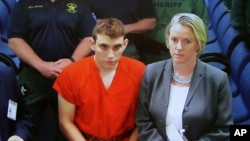A Florida court canceled a hearing scheduled for Tuesday for the 19-year-old man accused of carrying out the second-deadliest shooting at a public school in U.S. history after a deal between prosecutors and defense attorneys, the suspect's lawyer said.
Prosecutors had been scheduled to seek hair and DNA samples from Nikolas Cruz, who faces 17 murder counts for the Feb. 14 rampage at Marjory Stoneman Douglas High School in Parkland, Florida, an affluent suburb of Fort Lauderdale.
Broward County prosecutors and Cruz's publicly appointed defender, Gordon Weekes, reached a deal late Monday to provide those samples, making the hearing unnecessary, Weekes said.
"There was no reason to push back," Weekes said. "It was a routine motion that the state attorney had filed. We submitted an agreed order and there was no need for a court to hear the motion."
The hearing would have been the second courtroom appearance for Cruz since the shooting.
The massacre, carried out with a legally purchased AR-15 assault rifle, inflamed the long-running U.S. debate on gun rights, which are addressed in the Second Amendment of the U.S. Constitution.
Cruz's case is due to return to court on Wednesday when a hearing will determine whether he has sufficient assets to pay for his own defense, Weekes said.
The shooting has rattled long-drawn political lines on gun rights in the United States, where Republican officials have often opposed efforts by gun control advocates to tighten gun ownership laws, partly out of concern about retribution by the powerful National Rifle Association.
U.S. President Donald Trump, a Republican who backed gun rights during and since his 2016 presidential campaign, has been under pressure to show he is responding without alienating Republicans who oppose firearms restrictions.
On Monday, he met with 35 governors, urging them to disregard pressure from the NRA as they seek to address firearms safety and school security.
Trump has embraced the call to safeguard schools by arming teachers but also has voiced support for strengthening background checks for prospective gun buyers — a proposal the NRA has traditionally resisted.





